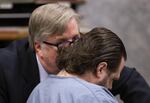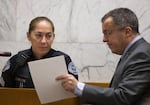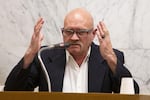The Big Picture
Jeremy Christian is accused of killing two people and injuring a third in a stabbing attack on a Portland MAX light rail train in May 2017.
Last week, witnesses testified that Christian was shouting racist comments while two black teenage girls — Walia Mohamed and Destinee Mangum — were nearby on the train. Mohamed is Muslim and was wearing a hijab.
Christian is also accused of harassing and assaulting Demetria Hester, an African American woman, on a MAX train the day prior.
He faces a dozen felony and misdemeanor charges, including multiple counts of first-degree murder and intimidation.
The Highlights (What Happened Monday)
Jeremy Christian’s defense team began presenting its case to the court Monday.
Defense attorneys began the day by arguing a motion they filed over the weekend — looking to include more evidence in their case. Specifically, the evidence pertains to Micah Fletcher, the survivor in the stabbing attack, and his actions in political counter-protests in Vancouver, Washington, and the Montavilla neighborhood in Portland.
Fletcher last week testified that he had been part of protests in the past and was arrested at a protest in Vancouver in 2017 — accused of throwing a smoke bomb.
Dean Smith, one of Christian’s defense attorneys, called the information in Fletcher’s testimony “not accurate.”
Smith said Fletcher was not acting alone at those protests and rallies, but rather in conjunction with antifa, and that’s what the defense is looking to prove with additional evidence and witnesses. They are also looking to establish that Fletcher has a bias, due to his personal beliefs.

Defense attorneys in Jeremy Christian's trial present their case on Monday, Feb. 10, 2020.
Beth Nakamura / The Oregonian/OregonLive/Pool
Jeff Howes, first assistant to the district attorney, responded that Fletcher’s bias has already been established.
Howes said that Fletcher had testified “that he strongly believes in certain things and is willing to take actions on those beliefs.”
Howes also said that Fletcher was not asked during his testimony whether he acted alone but whether he went alone.
“He’s concrete, and he’s literal,” Howes said of Fletcher’s testimony.
Multnomah County Circuit Court Judge Cheryl Albrecht said she would allow the testimony of Vancouver police officers the defense had called to speak to Fletcher’s actions at the protest where he was arrested. But she said she would exclude additional evidence regarding the rally in Montavilla.
The defense’s first witness Monday was Sgt. Holly Musser with the Vancouver Police Department. Musser was at the Vancouver protest where Fletcher was arrested.
She said she observed Fletcher “handing kind of like a firework to another protester. … The other protester lit it and threw it into the middle [of the park] where I was at.”
She said she then saw Fletcher running from the scene, and alerted other officers via her radio.

Vancouver Police Sgt. Holly Musser testifies at the Jeremy Christian trial, February 10, 2020.
Beth Nakamura / The Oregonian/OregonLive/Pool
The next witness was Vancouver Police Sgt. Patrick Johns. Johns was one of the officers who responded to Musser’s radio call.
“We contacted him, detained him,” Johns said of Fletcher. “He was very compliant and quite tired from running a few blocks. He didn’t give us any trouble.”
After Fletcher’s arrest, he pleaded guilty, went into a diversion program and the charge was dismissed, prosecutor Howes said.
The defense’s next witness was Portland Police Bureau officer Christopher MacDonald. MacDonald was present when Christian was arrested after the MAX train stabbings on May 26, 2017.
He said he thought Christian was on some sort of stimulant drug, but he also testified he’s not a “drug recognition expert” — an officer who has been trained to identify people under the influence of intoxicants.
“He just seemed sped up,” MacDonald said. “His actions were faster than that of a normal person. He continued to speak in sort of a motorized fashion. He just kept going and going.”
In his cross examination, Chief Deputy District Attorney Don Rees, asked if MacDonald had observed people using alcohol who could potentially act in ways they don’t normally act, such as being aggressive or starting fights.
“Yes,” MacDonald replied.
One of Christian’s defense attorneys, Greg Scholl, also asked if someone with a mental illness could act in this way. MacDonald also replied, “Yes.”
The defense also called Demetria Hester, the woman Christian is accused of assaulting on another MAX train the night before the stabbings.
Footage from inside the train and on the platform, along with witness testimony, showed Christian on a similar rant that night. Hester had told Christian to “shut up,” and throughout her train ride, she said, Christian continuously threatened her.
When exiting the train, Hester sprayed Christian with mace and Christian threw a 32-ounce Gatorade bottle, half-full of wine, at Hester’s eye, causing immediate bruising and ongoing issues with her vision, she testified.
Christian’s defense team played video from a press conference in August 2017 in which Hester talked to reporters about her encounter with Christian.
In the video, Hester said Christian hit her with the bottle first and then she sprayed her mace. She also said she went over and kicked Christian in the groin, none of which was shown in the train platform security video.
The defense did not go into any questioning about her specific statements, but instead just asked her if the video was an accurate representation of what she had related at the press conference. “Yes,” she replied.
Howes, with the prosecution, added some context to the press conference.
Under questioning, Hester said the press conference was organized by Pastor E.D. Mondaine of the Celebration Tabernacle Church. It came six days after the white supremacist rally that took place in Charlottesville, Virginia, in August 2017.
The defense also asked her about her criminal background, bringing up theft and forgery convictions from 2008.
Hester’s testimony was less than 10 minutes.
Another witness the defense called was Stephen Yerger. He’s self-employed, working for a company in Idaho that trains people in the use of force.
Yerger talked about de-escalation tactics. In reviewing the materials from this case, he called Fletcher’s actions with Christian on the MAX train “clearly escalating.”
It was “basically pouring gasoline on the fire,” Yerger said of Fletcher’s way of approaching Christian. “Loud shouting, being very confrontational.”
He spoke similarly of Taliesin Namkai-Meche, one of the deceased victims of the attack, who had approached Christian on the train in attempts to take video of his ranting.

Stephen Yerger testified about de-escalation techniques and other issues relevant to the Jeremy Christian trial, February 10, 2020.
Beth Nakamura / The Oregonian/OregonLive/Pool
“At first glance, it may appear to be harmless, but it’s actually very confrontational,” Yerger said. “He sat in the chair at an angle, facing Mr.Christian and put a phone in his face.”
Yerger continued: “He came to Mr.Christian. Mr.Christian did not come to him.”
In his testimony, Fletcher said he was acting in defense of Namkai-Meche.
“This third-party intervention … is considered very high risk,” Yerger said. “Too many unknown variables.”
He continued: “When a person is intervening on behalf of a third party … the person may have a health issue; they may have a mental health issue; they may have a weapon; they may have specialized training. …”
Yerger also called Christian’s shoving of Fletcher and Namkai-Meche “a defensive push.”
“It’s just a push creating distance. He didn’t push and then advance on them,” he said.
Christian’s defense attorney, Smith, brought up some of Christian’s comments during the altercation, such as Christian saying, “Do something, bitch,” to Namkai-Meche and Fletcher.
“Would you characterize it as a warning or a threat?” Smith asked Yerger.
“It’s just talk,” Yerger responded.
Yerger also said, about Christian’s claim he was acting in self defense with a knife, that if there is a disparity — as in two people confronting one person — “you have a greater latitude you can do to defend yourself.”
He continued: “You have different options that you wouldn’t have if that disparity didn’t exist.”
Yerger also testified that the fact that Namkai-Meche’s hands were full, holding containers of food, was not relevant.
Howes, with the prosecution, intensely questioned Yerger during his cross-examination.
“When you use the analogy ‘gasoline on the fire,' Mr. Christian is the fire in that analogy, right?”
Yerger said, “No” and that that’s not what he meant with the analogy.
“What I was referring to was when you approach someone who’s already agitated … you create the fire.”
Howes also asked Yerger if he had seen a slowed-down compilation of video from the train, that the jury and court was shown last week. Yerger said he had not seen it, and was not aware of that video.
Howes asked if Yerger thought that the defense might not show him the video unless it would help their case. Yerger skirted around the question momentarily, saying things like: “I assume if they thought it would help me in my assessment, they would’ve showed me.”
Eventually Howes prompted Yerger to directly answer the question.
“I think that’s a given,” Yerger said of not being shown the video potentially in an attempt to help the defense’s case. “But I’m not going to assume that.”
Howes also asked Yerger if he knew about specific laws in Oregon pertaining to self-defense or provocation.
“I don’t know those by heart, sir,” Yerger said.
Christian audibly responded to some of Yerger’s testimony. Judge Albrecht reminded Christian, “The next time you do an outburst, we’re going to be escorting you out."
What Happens Next
The defense will continue presenting its case and calling witnesses Monday. It expects its case to last through Thursday. After that, the prosecution could begin a rebuttal case, followed by closing arguments from both sides.
Go Deeper
- Judge In TriMet Murder Trial Refuses To Drop Charges
- Woman Assaulted Day Prior To MAX Train Killings Testifies In Trial
- Jeremy Christian's Team Will Argue Self-Defense In TriMet Stabbing Trial

